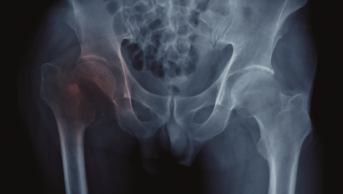
Helen Williams
Heart attack survivors who receive regular injections of the anti-inflammatory drug canakinumab have a reduced risk of further attacks and a “significantly” reduced risk of cancer, according to research published in The New England Journal of Medicine (NEJM) (27 August 2017)[1]
.
In the study, 10,061 patients who had a history of heart attack were randomly assigned either injected doses of canakinumab (50mg, 150mg, or 300mg) every three months, or placebo.
Researchers then tracked the patients for a median of 3.7 years and recorded non-fatal myocardial infarction, non-fatal stroke, or cardiovascular death.
They found no significant effect in the 50mg patient group (hazard ratio, 0.93; P=0.30, 95% confidence interval [CI], 0.80 to 1.07) compared with placebo, but found that the 150mg dose led to a significantly lower rate of recurrent cardiovascular events (hazard ratio vs. placebo, 0.85; P=0.02075, with a threshold P value of 0.02115).
Furthermore, when researchers looked at the incidence of cancer in the different patient groups they discovered that cancer mortality was “significantly” lower in canakinumab patients compared with placebo patients.
Canakinumab was associated with a higher incidence of fatal infection than placebo, but there was no significant difference in all-cause mortality (hazard ratio for all canakinumab doses vs. placebo, 0.94; 95% CI, 0.83 to 1.06; P=0.31).
“This study is the first to establish the key role of inflammation in atheromatous disease,” said Helen Williams, consultant pharmacist for cardiovascular (CV) disease in South London.
“It demonstrated that an intervention targeting inflammation, without affecting the lipid profile, can reduce CV events — although the reduction seen was modest.”
However, she added that it was unlikely that canakinumab would become a mainstream treatment because the reduction in CV events seen had been small and there were some safety issues highlighted by the study.
Another trial — the COMPASS study presented at the European Society of Cardiology (ESC) congress 2017 — found that the drug rivaroxaban (Xarelto, Bayer), when taken daily in combination with a 100mg aspirin, led to a 22% relative risk reduction (absolute risk reduction (ARR): 0.47%) in cardiovascular death compared with 100mg aspirin alone, which is the current standard of care[2]
.
The same combination also saw a 42% of relative risk reduction (ARR: 0.65%) in stroke.
Also presented at the ESC congress 2017, a four-year trial led by the University of Oxford and funded by Merck highlighted that a new cholesterol drug, anacetrapib, reduced the risk of heart attack and death by just 9% in 30,000 high-risk heart patients who were already taking statins[3]
. The reduction is thought to be linked to the effect that anacetrapib had on the patients’ low density lipoprotein (LDL) cholesterol rather than any novel action.
Williams warned against reading too much into the conclusions of all three studies.
“In the UK, we need to focus now on optimising the existing first-line therapies for CV risk reduction in both primary and secondary prevention, whilst the role of these new advances in future clinical practice is established,” she said.
- On 31 August 2017, this story was amended to correct a drug unit error.
References
[1] Ridker P, Everett B, Thuren T et al. Antiinflammatory therapy with Canakinumab for atherosclerotic disease. New Engl J Med 2017. doi: 10.1056/NEJMoa1707914
[2] Eikelboom J, Connolly SJ, Bosch J et al. Rivaroxaban with or without aspirin in stable cardiovascular disease. New Engl J Med 2017. doi: 10.1056/NEJMoa1709118
[3] Landray M, REVEAL Collaborative Group, Bowman L et al. Randomized evaluation of the effects of anacetrapib through lipid-modification (REVEAL)—a large-scale, randomized, placebo-controlled trial of the clinical effects of anacetrapib among people with established vascular disease. Am Heart J 2017;187:182–190. doi: 10.1016/j.ahj.2017.02.021


